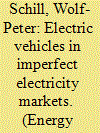| Srl | Item |
| 1 |
ID:
109650


|
|
|
|
|
| Publication |
2011.
|
| Summary/Abstract |
We use a game-theoretic model to analyze the impacts of a hypothetical fleet of plug-in electric vehicles on the imperfectly competitive German electricity market. Electric vehicles bring both additional demand and additional storage capacity to the market. We determine the effects on prices, welfare, and electricity generation for various cases with different players in charge of vehicle operations. Vehicle loading increases generator profits, but decreases consumer surplus in the power market. If excess vehicle batteries can be used for storage, welfare results are reversed: generating firms suffer from the price-smoothing effect of additional storage, whereas power consumers benefit despite increasing overall demand. Strategic players tend to under-utilize the storage capacity of the vehicle fleet, which may have negative welfare implications. In contrast, we find a market power-mitigating effect of electric vehicle recharging on oligopolistic generators. Overall, electric vehicles are unlikely to be a relevant source of market power in Germany in the foreseeable future.
|
|
|
|
|
|
|
|
|
|
|
|
|
|
|
|
| 2 |
ID:
103332


|
|
|
|
|
| Publication |
2011.
|
| Summary/Abstract |
Despite political activities to foster a low-carbon energy transition, Germany currently sees a considerable number of new coal power plants being added to its power mix. There are several possible drivers for this "dash for coal", but it is widely accepted that windfall profits gained through free allocation of ETS certificates play an important role. Yet the quantification of allocation-related investment distortions has been limited to back-of-the envelope calculations and stylized models so far. We close this gap with a numerical model integrating both Germany's particular allocation rules and its specific power generation structure. We find that technology specific new entrant provisions have substantially increased incentives to invest in hard coal plants red to natural gas at the time of the ETS onset. More precisely, disproportionate windfall profits compared more than half the total capital costs of a hard coal plant. Moreover, shorter periods of free allocations would not have turned investors' favours towards the cleaner natural gas technology because of pre-existing economic advantages for coal. In contrast, full auctioning of permits or a single best available technology benchmark would have made natural gas the predominant technology of choice.
|
|
|
|
|
|
|
|
|
|
|
|
|
|
|
|